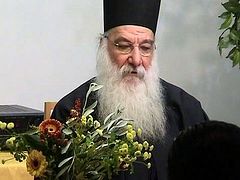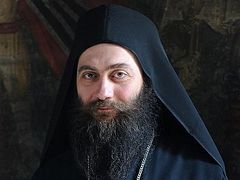Monk Nikon is abbot (geronda) of St. Spyridon’s Cell attached to the New Skete on Holy Mount Athos and a disciple of Elder Ephraim of Arizona.
An empty Communion spoon
 Monk Nikon of the New Skete After having supper in the refectory the nuns of a convent in the “Greek” Macedonia collected the dirty dishes on trays and carried them off to the kitchen. Suddenly a loud noise of dishes falling down was heard from the kitchen. At that time the abbess was talking to somebody; hearing the noise, she went to the kitchen and found the tray on the floor. There were also spoons, forks, broken plates and glasses on the floor, and a nun was picking them up.
Monk Nikon of the New Skete After having supper in the refectory the nuns of a convent in the “Greek” Macedonia collected the dirty dishes on trays and carried them off to the kitchen. Suddenly a loud noise of dishes falling down was heard from the kitchen. At that time the abbess was talking to somebody; hearing the noise, she went to the kitchen and found the tray on the floor. There were also spoons, forks, broken plates and glasses on the floor, and a nun was picking them up.
“Is it you who dropped the tray with the dishes?”
“Your blessing, mother!” the nun answered.
“Pick everything up. And you won’t receive Communion tomorrow!”
It was Saturday.
“You won’t commune tomorrow! And you will make 500 bows!”
“Bless, mother!”
The nun said nothing else. The next morning everybody received Communion, while the nun was standing behind and weeping. Walking past the nun, the abbess saw tears streaming from her eyes, but her face was shining with joy and she looked three times as happy as the other sisters. Astonished, the mother-superior wondered:
“Why are you weeping?”
The nun replied:
“When the sisters were receiving the Holy Gifts, one of them came up to the chalice; but a bright ball came out of the Communion spoon, entered my mouth and filled me with joy, happiness and peace, and tears started streaming from my eyes.”
The abbess asked her:
“Which of the sisters was taking Communion at that moment?”
But the nun hesitated. The abbess wondered why she was slow to answer.
“That sister over there was receiving Communion,” she said.
The abbess called up the nun who had just taken Communion and who was upset.
The abbess asked her:
“What is the matter? Why are you upset?”
The sister replied angrily:
“The priest gave me Communion with an empty Communion spoon! There was nothing in it!”
The mother-superior understood that something had happened.
“And what happened last evening?” she asked the weeping nun.
The nun was silent.
“Bless, mother!” that was all she said.
“Tell me what happened last night.”
At last she revealed:
“Last evening a sister came up to me in the kitchen, jogged me inadvertently, and I dropped the tray with the dishes.”
This is how we lose something, find something, come to know what Holy Communion is like, and learn to see our passions.
When we are in a dark room, we see few items in it. When the door begins to open and Divine grace enters, we start to see more items in the room: a wardrobe, chairs, etc… The more light comes into the room, the more small things we see; and when the door is wide open, we even see dust in the room.
This is how the saints became the saints. St. Gregory Palamas constantly prayed, “Lord, enlighten my darkness!”
These are the saints we know about.
A five-hour prayer
Do you know how many saints there are among laypeople! I know saints living in the world, married saints. One man has visited Mt. Athos for many years now. He is married and has many children. During one of his stays he went to a skete to meet an elder in its cell. This man arrived to the skete late in the evening. It took him a long time to get there on foot. Night was falling, and he sat down to take a rest. He came to the elder’s cell very late. The skete monks saw him walking along the road and went out to meet him. The elder loved this man dearly. After talking with him, the elder said:
“Take this prayer rope!” And he gave him a large prayer rope. “Sit down on a chair and pray for a while because we have some work to do! Today I won’t be able to talk to you anymore!”
“Bless, Geronda!”
After visiting the elder’s cell he came to my cell, I let him in and we talked. He related:
“I sat down on a chair and started praying, ‘Lord Jesus Christ, have mercy on me, a sinner!’
“Half an hour passed, then an hour, two hours…, and night fell. I got tired of sitting. Three hours passed. It was dark in the cell. I could hear nothing.”
“Well, didn’t you think that the elder may have simply forgotten about you and gone to sleep?” I said to him.
“No, I didn’t.”
“And what did you think about?”
“Well, I thought that you don’t celebrate Church festivals here the way we do… You may be commemorating some saint today, so I prayed on the prayer rope for four or five hours running at night.”
I looked at him.
“Well, hold on! Did you pray on the prayer rope for five hours?!”
It is not pronouncing the prayer that matters—what makes sense is focusing on the prayer, its words, and that the mind shouldn’t wander off somewhere.
“All right. What did you think about all that time?”
“I didn’t think about anything. When we pray, the mind shouldn’t get distracted.”
“Do you want to say that you prayed for five hours nonstop and your mind wasn’t distracted by anything?”
“Perhaps it was distracted once.”
He said, “It was distracted once” in five hours! Try to repeat inwardly, “Lord Jesus Christ, have mercy on me, a sinner!” for five minutes, and not five hours—without imagining anything, without thinking about anything—and you will understand whether you can do it or not.
“And what did you think about?”
What did I expect to hear? And what did he say to me?
“That I am holding a rod in my hands and fishing at sea!”
Listen, such an innocent thought it was!
“But I picked myself up right away and said to myself, ‘I am here to pray and my mind should stay focused.’ And I concentrated on prayer again,” he continued.
I said nothing to him. Even Athonite monks don’t perform this kind of podvig. And he proceeded with his story:
“At some point at night a noise was heard—the monks had awoken.
“The elder got back to the cell, washed his face and saw something black on the chair. He lit the lantern, shone it on the chair and, and seeing a man with a prayer rope, asked:
‘Ah, you are already awake?’
‘No, Geronda, I stayed up.’
‘Why didn’t you sleep?’ Geronda asked.
‘You said that you would tell me when I should stop praying.’”
Indeed during their earlier conversation the pilgrim had asked the elder how long he should pray and the elder had replied that he would tell him about that later on.
And he prayed for five hours. We monks are unable to perform such a podvig, such an obedience, display such humility and simplicity. It was an extraordinary podvig. And he risked it. What if he had realized that? He would have become proud of what he had achieved. The elder understood that at once and in order to prevent the man from falling into pride and protect him from the demon of pride who destroys everything he joked at him:
“Silly billy! Anyone would have understood that I forgot about you! Can pride give you any more intelligence so you can grasp the simplest thing anyone can grasp! Can egoism help you understand that?! You’d better go to sleep!”
“The elder was right,” he said to me.
And I pretended to be strict too:
“He certainly was right! You should have figured it out!”
What else could I tell him?
To be continued.



